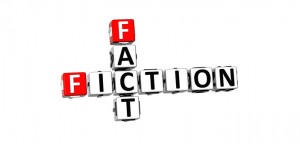Trying to describe the stereotypical Barefoot Writer is tricky, without falling into stereotypes. It’s a lot like trying to answer one of the most common questions posed to those of us who enjoy the Barefoot Writer lifestyle:
“What exactly is it you DO?”
When I first started out, I’d try to explain the concept of being a freelance writer to people who didn’t understand. I’d talk about copywriting. I’d touch on the huge need for content online. I’d explain that effective emails have to be written by somebody.
Sometimes, this was enough and the questions would stop. When the lengthy explanations didn’t do any good, I’d use my go-to line:
“I write words that connect people to the things they want.”
Because really, that’s what we do. Whether you’re drafting an e-book that explains how to re-grout bathroom tile or managing the Facebook profile of a cupcake bakery, your goal is to craft copy that tells people where to go and what to do to get the things they want.
Other common questions from those outside the Barefoot Writing World have to do with how we make a living — i.e., how we get paid.
To people who have never known life beyond the corporate world, or who’ve never had a job that didn’t involve punching a clock, this is harder to grasp. Questions I’ve heard over the years are:
“So, you don’t have a boss? Who tells you what to do?”
“You can work from anywhere? Surely you have to report in somewhere?”
“And you get paid directly for this? Like, real money?”
It comes down to this: The idea of living a well-funded, freedom-filled lifestyle as a writer is hard for some people to understand because it goes against the belief systems they were raised with. It clashes with the stereotypes they’ve grown up believing.
If someone grew up in a family where both parents worked outside the home, and where their friends and family today are all entrenched in the corporate world, then it’s easy to see how any kind of alternative is surprising.
The reality is that most people just don’t know a lot about the writing world. And when people don’t know about something, they tend to fall back on stereotypes.
Certainly, there are a fair number of writer stereotypes. Some are funny. A few raise eyebrows. Plenty are downright wrong.
But, are writer stereotypes for real?
I asked around to find out what other people think a “writer” is. Here are some of the most common answers, along with the reality of how those stereotypes relate to our brand of Barefoot Writers:
|
Stereotype |
Reality for Barefoot Writers |
|
Writers are … |
|
|
Loners |
Sure. Most of us work from home, on our own. But we have a tight-knit community of support and get together for webinars and conferences all the time. Plus, it’s easy to share and stay connected through Facebook and all the other social media networking tools. |
|
Coffee junkies |
Not all, but most. Although … isn’t that true for the rest of the world? |
|
Chain-smokers |
None of the writers I know are … but I guess it’s possible. |
|
Brooding and cynical |
Depends on the industry you write for. In health and finance, suspicious copy is often more successful. In self-help and religious writing, not so much. |
|
Born, not made |
Not true! Writing is a craft that can be learned by anyone, anywhere, and at anytime in their life. |
|
Bad at math |
Who cares? As long as you can total your fees correctly when billing clients, you’re good to go. |
|
Writers love … |
|
|
Liquor on the rocks |
I know a few, sure. But I know more who love their wine. |
|
Grammar |
Depends. Grammar concepts can prompt a great forum thread, or they can also be just plain dull. For us, grammar is simply a tool to make our writing more conversational and to be ignored if it makes our writing stronger. You certainly don’t have to be an expert at grammar to be a great writer. |
|
Cats |
Who doesn’t love cats? Okay, a lot of people … but plenty of Barefoot Writers have cats … and plenty don’t. |
|
Writers always … |
|
|
Think about writing, all the time |
It depends on the project you’re working on. If it’s something that fires you up and ignites your passions, then yes — it’s hard to turn those thoughts off. Plus, great ideas for writing can be found anytime, anywhere. |
|
Have ink stains on their fingers |
Most of us use keyboards … so, no. |
|
Spend a lot of time in cafes |
Sure! Especially those of us who are also coffee junkies. Cafés are great when you want to change up your writing routine or go people-watching for ideas. |
|
Use big words |
Sometimes … but it’s the short, common words used every day that usually prove the most effective at getting a point across. |
|
Complain about writer’s block |
Everybody runs short on ideas at some point. That’s usually when it’s time to take a break … go for a walk … get away for the weekend. Easy to do when you’re in charge of your own schedule. |
|
Walk out of the shower half-shaven because they’re so distracted by new writing ideas |
This stereotype is my favorite. If you do this, that must mean you’ve hit on a really great writing idea! |
|
Write into the wee hours of the night |
Lots of folks do, yes. But the most prolific Barefoot Writers I know do their best writing early in the morning. |
|
Carry around notebooks to scribble ideas in |
Who doesn’t? Assuming we consider our mobile devices the equivalent of notebooks. It’s a smart thing to do, too, since you never know when your next great idea will hit. |
Sure, plenty of writers fall into some version of these stereotypes. But the majority are working writers who make a living putting words together for practical use. They’re sane, healthy, and functional, and they live comfortably on fees and royalties.
The bottom line here is, Barefoot Writers come in all forms. Our community is made up of city folks, country folks, and even a few who run their own farms. Some live internationally, some travel full-time. Some think writing a 20-page sales letter is the height of excitement, some balk at the idea and revel in 280-character quips on Twitter.
We have planners and pantsters (those who fly by the seat of their pants when tackling projects). We have writers who cycle through projects like the steady tortoise and writers who capitalize on bursts of energy, like the hare.
I know writers who revel in insider trading and blog about it day and night. Others get lost in the drama of an appeal for a nonprofit. Some write about safety products for kids, some focus on aluminum cabinetry.
The most successful ones write about topics that fascinate them — like Cyndee Davis and chocolate or Steve Coombes and his expertise in disaster preparedness.
There’s nothing typical about being a Barefoot Writer. There’s no point wanting to be the shiny stereotype people think a writer is.
But, there is a lot of value in going after this lifestyle on your own terms and making it real. So, think about it. What kind of writer are you? Do any of the writer stereotypes fit you?
If they do, fine. If they don’t, that’s fine, too. Choose your writing direction and go for it. Finding contentment in the end is all that really matters.






